Smart Bear Live!
The startup advice show
In the spirit of call-in radio talk shows, Jason Cohen and a rotating bad-ass startup-celebrity co-host get brutally honest with founders of real companies, who have real puzzles and struggles.
We cut to the heart of issues, then build back up with ideas, options, strategies, and decisions. Topics include scaling, pitch-practice for raising money or sales, solving growth or cancellation problems, operational questions of running a company, finding the right idea, prioritizing, and creating a strategy. Each show has a theme that aligns with the co-host, so callers get special expertise, and listeners hear new answers even to the same questions.
Reserved Spaces
Website | Reddit Community | Twitter | Bluesky | Instagram | Threads | LinkedIn | Slack
Style
My natural style is “radical candor,” i.e. blunt and direct, but coming from a caring place.
I have repeatedly gotten the feedback that I’m tough on people—maybe too tough—and “it felt like you were just tearing me down”, but by the end of the session they “realized that actually you were getting me to face the truth that others were afraid to tell me” and that “once we started ideating how to fix it, it was extremely helpful and now I’m excited to go do it.”
This style is evidenced not only by past episodes, but fifteen years of advising startups:
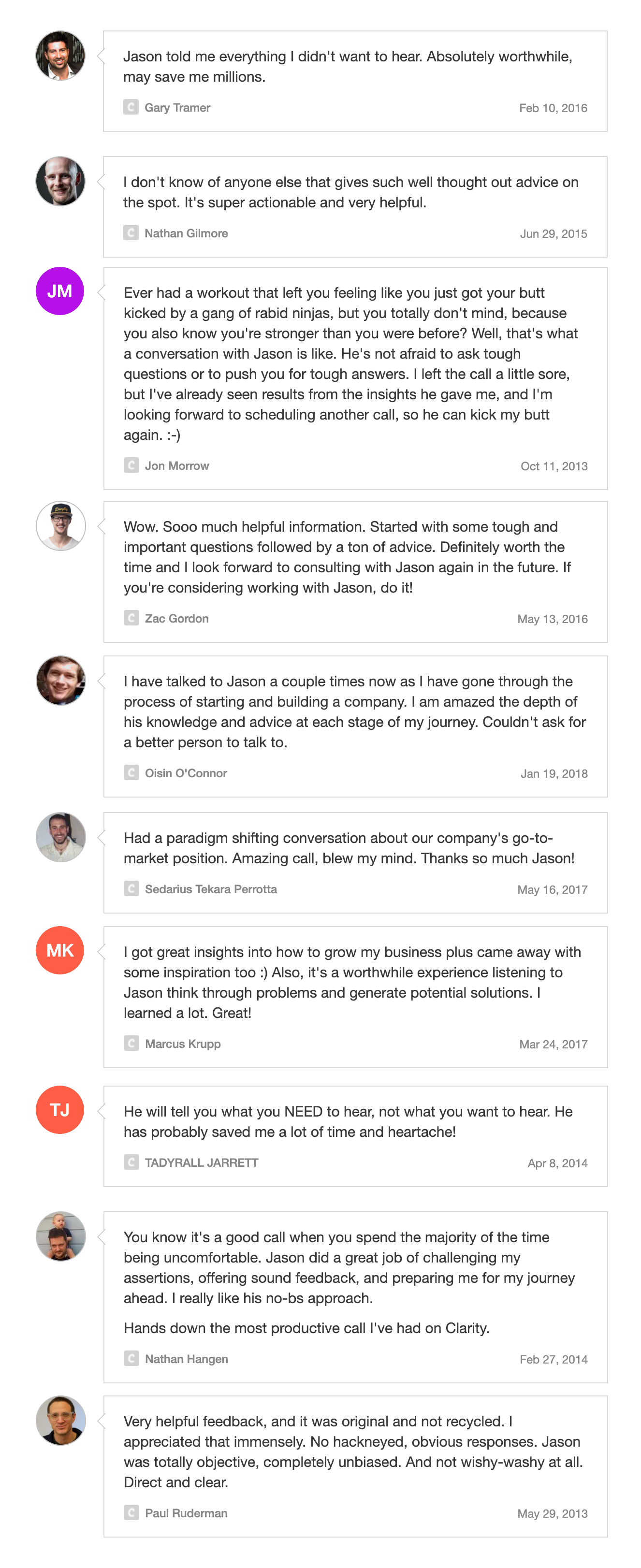
Reviews from Clarity
Co-hosts
Having been “internet famous” in the startup world for nearly two decades, having also been on innumerable podcasts as a guest, I’m able to invite a wide variety of co-hosts to join the show.
The idea is to have one co-host each episode. There are many benefits:
- Variety in answers. Even identical questions from previous episodes receive fresh answers.
- Most have their own audiences. A new pool from which to source guests and to promote the show.
- Naturally supports “themed” shows. e.g. An eCommerce expert would make an eCommerce-themed episode more rich than I would be on my own. Themes can be along any dimension:
- Geography (challenges for startups in Spain)
- Business Model (SaaS / hardware / agencies / freelancing / retail)
- Funding (bootstrapping / funded)
- Stage (pre-revenue / PMF / scaling / mature / selling)
- Operational Challenge (initial marketing, expand existing product, cancellation, creating a sales team, create a financial team, hiring your first manager, structuring your organization, online marketing, optimization, fundraising)
- Industry (real estate, education, marketing, dev tools, …)
The quality bar must be set high for co-hosts. It’s only entertaining and useful if the co-host proactively engages with guests (not just parroting their usual lines), who is genuine, who has their own style and strong opinions.
I have a substantial list; sourcing will not be a problem.
Production
What has worked in the past:
- Solicit guest submissions. Includes type of question (e.g. strategic vs operational, a tear-down vs pitch-practice vs solving an operational problem, whether specific expertise is required).
- Line up a number of guests per episode. Quantity allows for some to no-show or to be a low-quality segment removed in the final cut.
- Depending on the time requirements from the co-host, time per guest can be variable.
- “Live” but then “Edited.” I think streaming live is exciting, but even so the vast majority of views will be of an edited version. We should not edit out the humanity; the “live” aspect is part of what makes it compelling. Perhaps early episodes are not live (for simplicity), but having audience interaction with ideas and questions, moderated by someone who isn’t in the primary flow, could make the show even more rich, leveraging the “live” aspect.
- Video to YouTube, audio to all podcasting platforms. My guess is most people want audio-only. Consolidating video-views on YouTube helps numbers. Video is useful not only to humanize, but to pull up websites, see slides, show research (e.g. pulling up competitors’ websites), etc..
- Promotion: This format and content is a promoter’s dream: A constant stream of soundbites and “advice”. Should be easy to build tons of promotional content, from short videos to short posts or blog posts. Hopefully some are also cross-promoted by co-hosts or guests. Common topic areas could be consolidated into “advice from the show” articles. Eventually even a book of all the best advice across 100 hosts and 1000 startups.
Expected challenges
- Managing co-hosts. Co-hosts are busy. Cancellation is impactful if guests are lined up specifically for them. Another co-host might have trouble jumping into their area of expertise. Solo episodes might be forced, or a short-list of generalist co-hosts who are eager to jump in on short notice.
- Managing guests. I expect all sorts of issues: Technical problems, bad network, bad sound, bad camera, trouble sharing a screen, no-shows, not enough command of English, timezone constraints, and more. By over-booking, perhaps we can overcome some of those issues, at least in the final cut, but this will be a perennial thing to manage.
- Finding guests. I’m hoping this is not a problem, as I have my own network, plus we’d ask the co-host to promote the intake form. One solution is to have some banter, questions, etc between me and the co-host. Another is to take questions people put out onto social media or Reddit, even if we can’t interact with the person (though this is significantly worse, as advice without context is equivalent to reading a blog post). Another is to realize that variable-length episodes are fine, even if it varies quite a bit.
- Sensitive Stuff. Some of the best topics are too sensitive to be public. Indeed, the required secrecy is part of what makes the topic compelling. Examples: co-founder issues, employee issues, fundamental strategic challenges, founder psychology, thinking about selling the company. Perhaps we just can’t go there, but what if there’s way to anonymize their end of the conversation? A simple way is to take a written question without details, but it’s substantially worse to “give advice” when you can’t interact. Perhaps it could work over chat; pausing would be annoying live, but could it be decent after tedious editing? Or masking the audio so the person can talk but is not identifiable, either with a distorted voice or using AI to parse their words, rewrite slightly for style, and “speak” it back out in a generic voice? Weird ideas, but if we solved it, it could be unique and compelling!
Lagniappe
Things that naturally happened in the past, or would be fun to institute:
- I started previous episodes by asking for only the company name, and then guessing what the company did based on that alone. Sometimes seriously, sometimes intentionally inventing something odd, like an improv game. It seemed to break the ice.
- Offer to cohosts and/or guests that I’ll wear their company’s hat during their episode / segment. I have a PO Box. I like wearing caps anyway beacuse I’m self-conscious about going bald, so this solves multiple problems. Not mentioned on the show, just quietly offer it offline.
- Ask listeners to comment with their own advice. Whether that’s on YouTube or social media, it would be a way for people to engage, have more ideas, actually help and encourage the guest. If the show is streamed live, those could come in live, engaged on social live, maybe the best ones brought into the show, if it doesn’t disrupt the flow and turn into the weird “pause while I read chat” that Twitch streamers tend to do.
Praise for advice from A Smart Bear
Only needed if we don’t know each other…


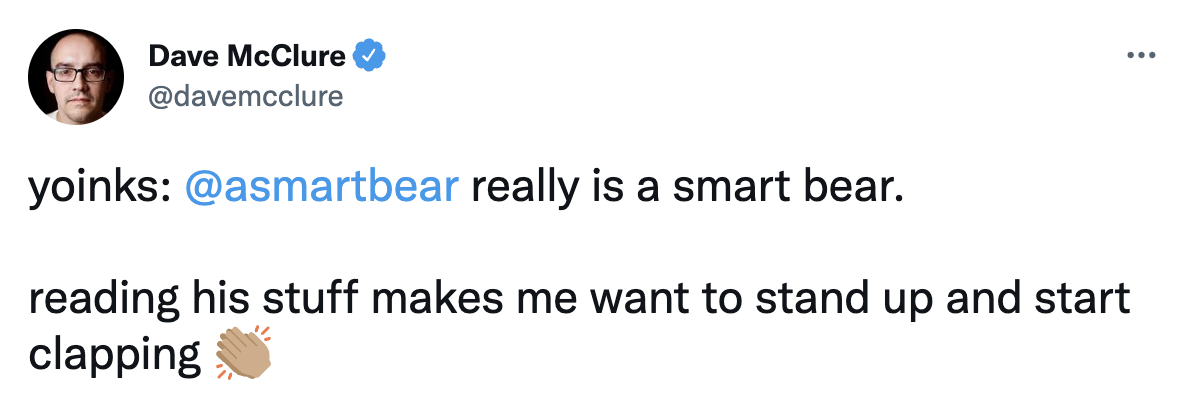
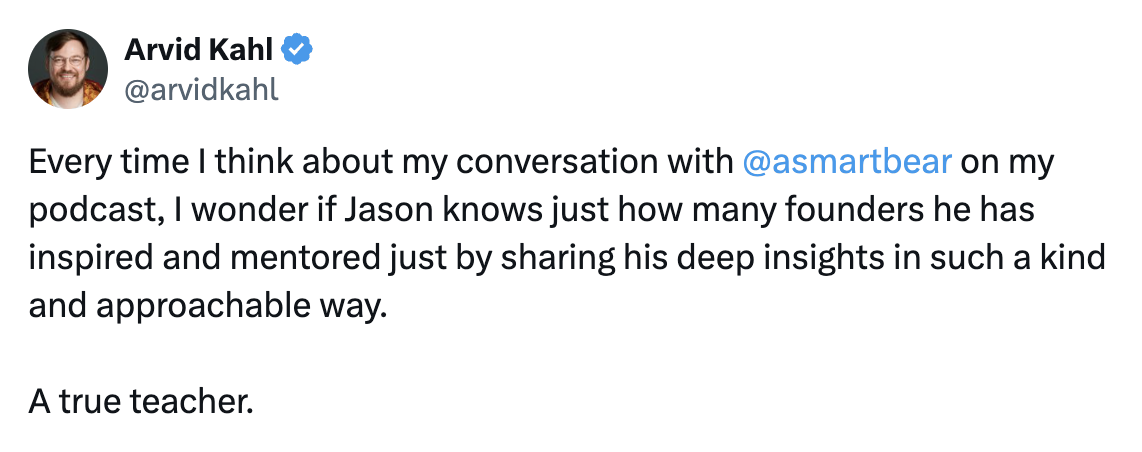
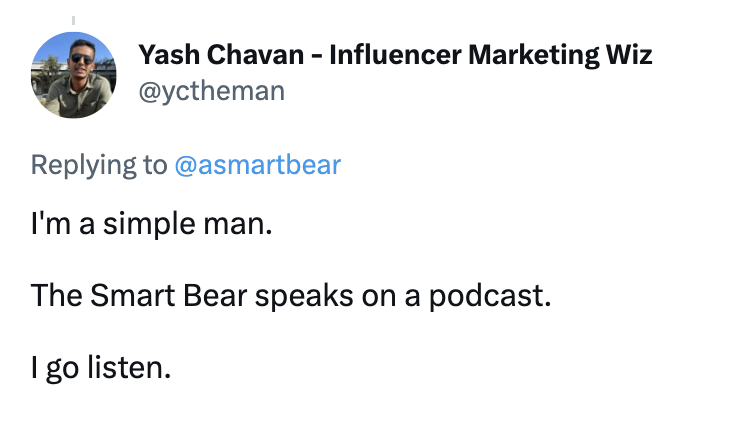





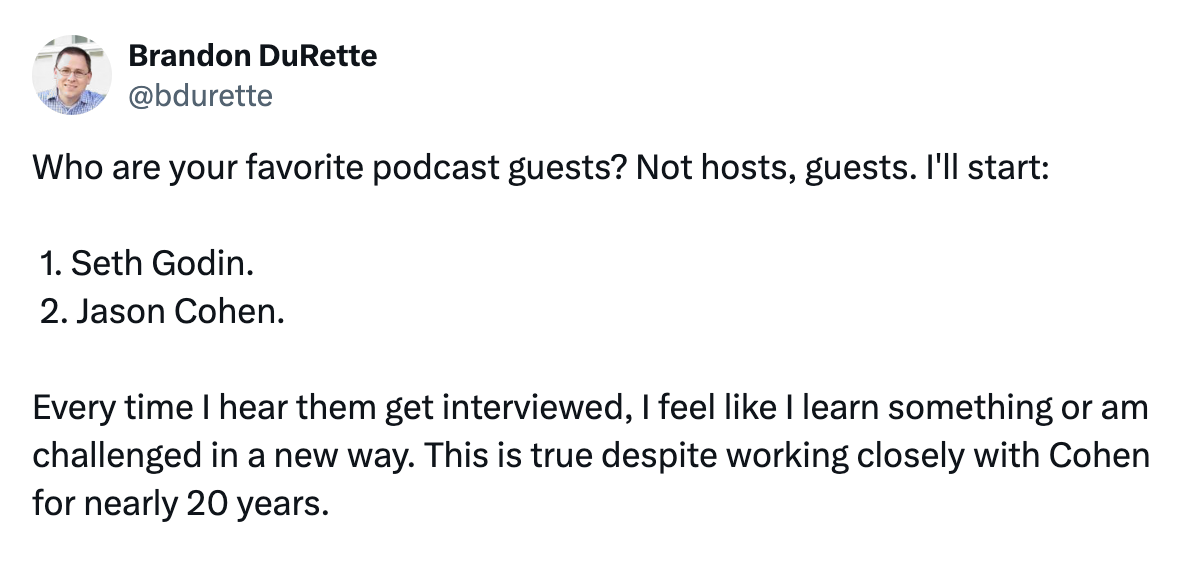
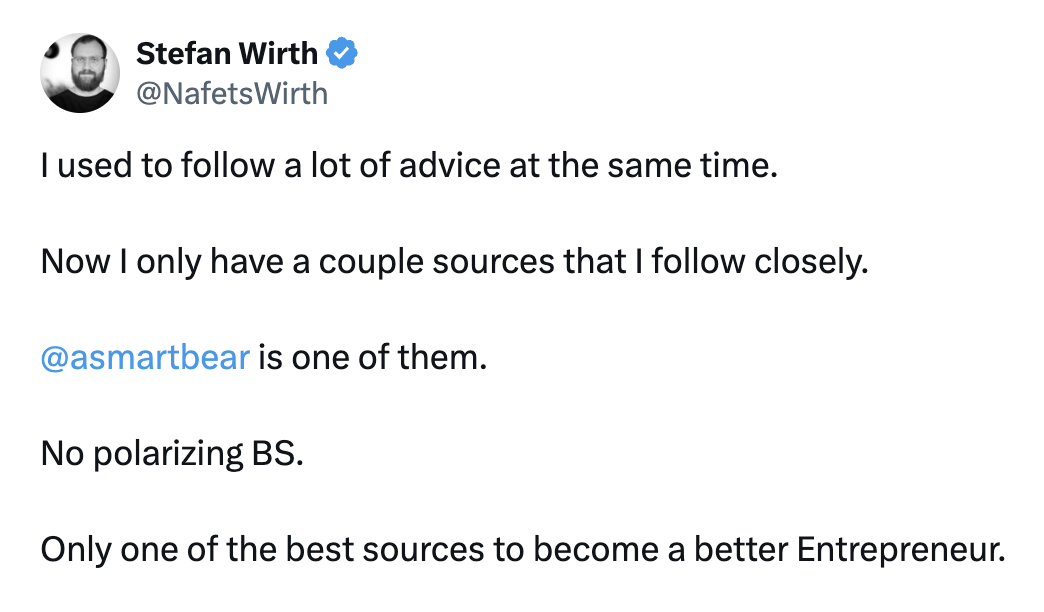

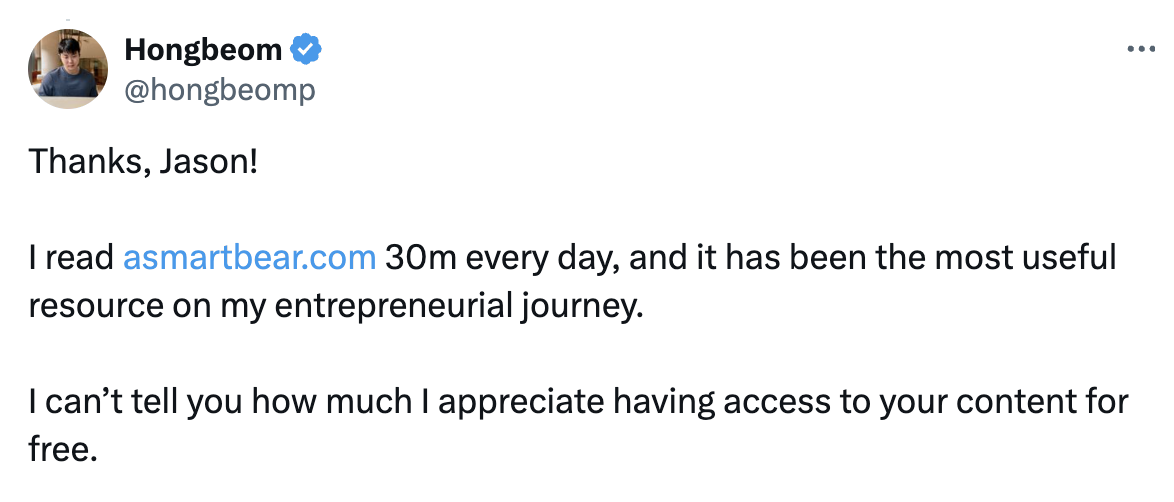


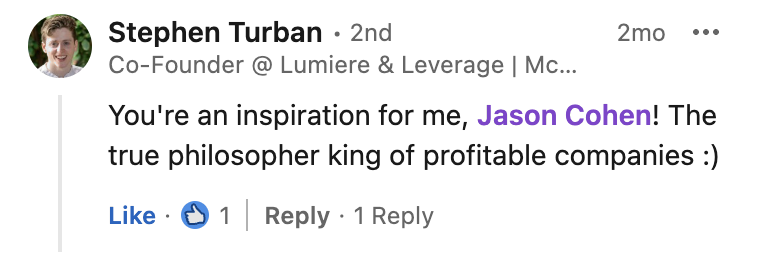

https://longform.asmartbear.com/smartbearlive/
© 2007-2026 Jason Cohen
 @asmartbear
@asmartbear







